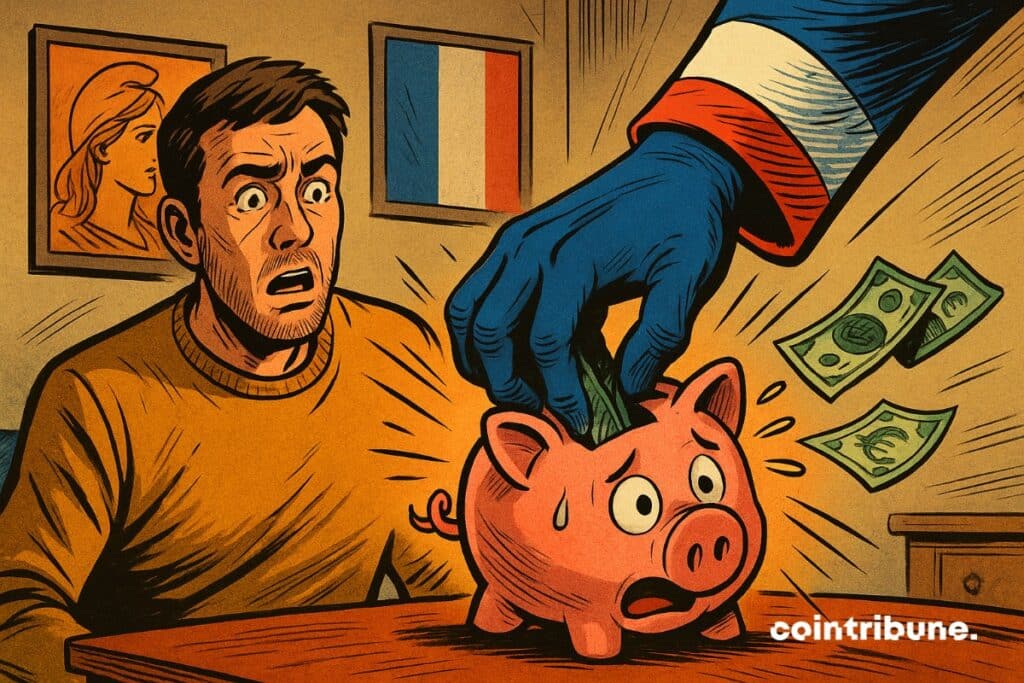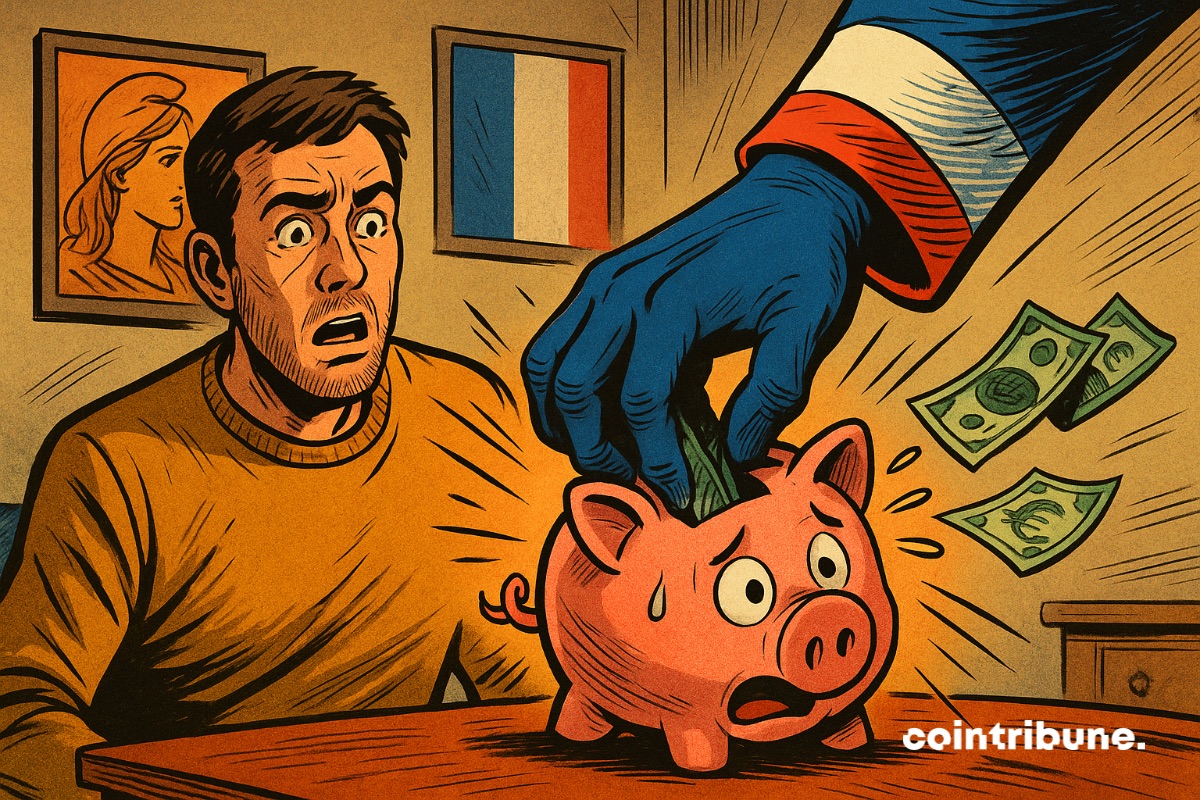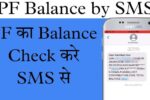While the French public debt exceeds EUR 3,300 billion, the worrying question occurs: can the state draw from the French savings to avoid bankruptcy? There is a growing concerns in the economic context under voltage between imagination, previous legislative and legal reality.

In short
- At the end of 2024, France’s public debt will reach 3,305.3 billion euros or 113 % of GDP.
- The state cannot legally request private savings without public necessity, legal basis and compensation.
- The Sapin 2 Act allows you to temporarily freeze access to certain life insurance contracts in the event of a crisis.
- There are indirect measures: increased taxation, exceptional contribution or state loans offered to individuals.
- The red line remains the constitutional protection of ownership, with the exception of cases of extreme crisis.
France: Public debt to historical heights
At the end of 2024, when the French deficit exploded, the French public debt reached 113 % of GDP or 113 % of GDP according to Insee and the Ministry of Economics. Since the health crisis in 2020, the level of debt France continued to rise: in 2019 it was 98 % of GDP, in 2021 it exceeded 114 %. Despite a slight decline, the trajectory remains worrying.
Some economists and citizens face this debt wall, powered by social expenditures, public assistance, energy transition and higher interest rates, fear a radical result: that the French state requires private savings to lighten the burden. But is it legally possible? What are the constitutional guarantees? And to what extent our money is really safe?
Savings requirement: Fantasy or legal option?
Basically, French savings are protected. Article 17 Declaration on Human Rights and Citizen of 1789 stipulates this ” The assets are inviolable and sacred law, no one can be deprived of it, except when it is necessary if necessary, of course, it requires, and under the condition of fair and previous compensation ».
Article 544 of the Civil Code also claims that it also claims that ‘ Property is the right to enjoy and have things in the most amazing way ».
In short, no, in France, the state cannot legally draw your bank accounts without justification or compensation. This would be an attack on private property, strictly under supervision.
Inframeful previous: Sapin 2 law 2
If the state cannot directly ” fly Savings, however, exist finer and perfectly legal mechanisms that can reduce the French approach to their own money. The Sapin 2 Act of 2016 is a symbolic example. It allows the High Council for Financial Stability (HCSF) to temporarily freeze the selection of certain life insurance contracts in the event of a serious crisis.
Displayed goal: To avoid extended panic movement on the financial markets. In other words, your savings would not be confiscated, but you can temporarily lose the right to it freely. Form of masked props? Lawyers are still thinking.
Can we force the French to finance public debt?
In the context of structural deficit in France, the state may seek to mobilize national savings other than their requirement. Historically, it has already happened. In 1945, an exceptional contribution to the remedy of public finances was imposed on capital. In 1983, an exceptional tax on capital gains was also established.
In both cases stand not ” taken Savings, but set targeted taxes on capital holders. Even today, several ways without violations of basic rights are possible:
- Increasing the taxation of investment products (brochures, life insurance, peas).
- Creating an exceptional tax on heritage or bank accounts.
- Commitment ” patriotic Investing in sovereign debt through savings securities offered to individuals.
These levers would allow the state to address national solidarity without violating the right to assets.
France: What the state cannot do
Despite temptation for certain policies, drastic measures, the French state cannot gain access to bank accounts without a clear and detailed legal basis.
Can’t:
- Arbitrarily seized current accounts or brochures A.
- Save the mandatory transmission of your savings to the cash register.
- Break life insurance or freezing contracts without justifying the systemic crisis.
Any damage to the assets must respect the constitutional triptych: public necessity, legal basis and compensation.
Alternative: to save and help the French state
Today, the French can voluntarily contribute to the financing of public debt while protecting their capital. Several options are possible:
- Sign up for government bonds through the official AFT website or through a banking advisor.
- Investment in a brochure or lept whose part of the funds is used to finance social housing, the lever of public policy.
- Participate programs of titles specially dedicated to individuals as in the case of ‘ Ministry of Finance accounts with a fixed rate During certain periods.
The French state that faces a record public debt that builds France on the verge of bankruptcy, cannot seize French savings in the state of law. However, it can direct, tax or reduce access temporarily under exceptional circumstances. Red line? Violation of the right of property. As long as the declaration of human rights and the Civil Code remains in force, France cannot act as a status of a spoiler. However, between partial frost, targeted taxation and patriotic incentives, the boundary between voluntary contribution and gentle restrictions could fade in the case of a deeper crisis.
Maximize your Cointribne experience with our “Read to Earn” program! For each article you read, get points and approach exclusive rewards. Sign up now and start to accumulate benefits.
The world is evolving and adaptation is the best weapon that survives in this undulating universe. I am interested in everything about blockchain and its derivatives. To share my experience and promote an area that fascinates me, nothing better than writing informative and relaxed articles simultaneously.
Renunciation
The words and opinions expressed in this article are involved only by their author and should not be considered investment counseling. Do your own research before any investment decision.







